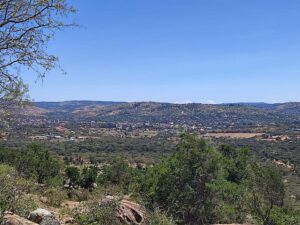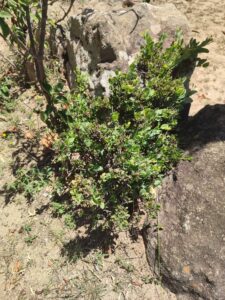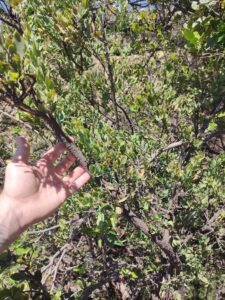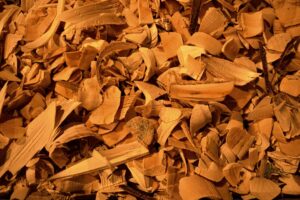- S(m)elling the Wild: WP1
The Case of Sandalwood
Manuel Standop (Doctoral Researcher) and Eric Kioko (Principal Investigator) investigate the (illicit) global production networks and supply chains around African sandalwood (Osyris lanceolata).
Global demand for sandalwood, fueled by the perfume and cosmetic industry, has increased its value tremendously. As India has depleted its wild stocks of Indian sandalwood (Santalum album) to the brink of extinction, a search for alternatives has begun since the end of the last millennium. One of the solutions is the natural substitute African sandalwood (Osyris lanceolata), which occurs naturally in Eastern and Southern Africa and, with its similar properties, offers a cost-effective and profitable alternative to Indian sandalwood.
Since 2002, the demand for African sandalwood has gradually depleted the wild stocks. CITES declared it endangered in 2004, and the Kenya Wildlife Service (KWS) acted in 2005. Despite a 2007 presidential ban and a 2013 law giving African sandalwood in Kenya the same protection status as white rhino and imposing life imprisonment for illegal harvesting, the trade peaked in the following decade. CITES estimates the annual harvest in East Africa at around 1000 tonnes.
Most of this biomass does not seem to simply enter the market. Instead, it is apparently used as a blending and adulteration substance for the far more valuable Indian sandalwood oil. As one of the most expensive essential oils, sandalwood oil is frequently subjected to counterfeiting practices.
¹ Convention on International Trade in Endangered Species of Wild Fauna and Flora
- WP 1: The Case of Sandalwood
Focus Questions
How does global demand shape local value regimes and production networks? How does the global economy affect the people’s social, environmental and economic everyday lives?
How do illicit value chains operate? Who benefits and who loses?
How do these networks emerge? What is the biographical and social background of the people becoming part of these networks?
What can these value chains reveal about the relationship between the shadow economy and the formal economy? How are these systems entangled and intertwined?
Background
Variations in legislation across East African nations contribute to intricate sandalwood smuggling and trade routes. Sourced in Kenya, the wood is illicitly transported to Uganda, presumably rebranded as a Ugandan product, and transported back to the ports at the coast for export to destinations such as India, Dubai, China, and Europe. The aim of the project is to trace this illicit chain using a “following” method, as developed by Appadurai, Harvey, Marcus and others, to track the path of sandalwood from Kenya and Uganda to Asia and Europe.
While global “supply chain capitalism” makes the flow of commodities fundamentally more complex, more opaque and thus more difficult to trace, it creates “legal grey zones” (Tsing 2009) and spaces for illicit activities. An analysis of these intermediate phases faces the challenge of illuminating the fragments, gaps and breaks as the central points of interest. Instead of telling the story of a flow, an attempt is made to look at its dis- and interruptions in the context of value creation. To cite Alison Hulme at this point: “Telling the story of why something becomes unfollowable, ought perhaps to be an equally valid methodological stance as accurately charting followable paths.”
A central task of the project is to analyze complex and dynamic networks in which many actors with different interests, skills and expertise come together, interact and clash. The flow of information therefore leads to smugglers, law enforcement institutions, environmental and nature conservation organizations, local communities that live with sandalwood, as well as international companies and expert groups. This diversity of actors and interlocutors requires a detailed network analysis that is able to map the nodes and lines as well as the synergies and contradictions.
As the project deals with a commodification process within the global economy involving a variety of actors in different locations, a multi-sited approach is absolutely necessary to capture the phenomenon. This relates not only to the geography, but also to the sites of action. Field research is conducted at conferences and trade fairs, in ports, in remote landscapes, on plantations, at national borders, in small processing centres and offices of international companies. In addition to research trips within Europe, fieldwork is conducted in Kenya, Uganda, Thailand and China.
Involved Members

Dr. Eric Kioko
Lecturer and Research Fellow at the Kenyatta University and the University of Bonn
Principal Investigator: S(m)elling the Wild: The Political Ecology of Arboreal Essential Oils and the Making of Olfactory Resources
Dr. Eric Kioko
Research interests: Peace & Conflict Studies, Environmental Crimes, Dynamics of Ethnic Relations, Environment & Community Sustainability, Poverty and Livelihood Analysis

Manuel Standop (M.A.)
Doctoral researcher: S(m)elling the Wild: The Political Ecology of Arboreal Essential Oils and the Making of Olfactory Resources
Project Manager of Work Package 1: The Case of Sandalwood
Manuel Standop (M.A)
Research interests: Political Ecology, Economic Anthropology, Political Anthropology, Political Economy, Anthropology of Value, Commodification processes, Resourcification,
Contact: manuel.standop@uni-koeln.de



